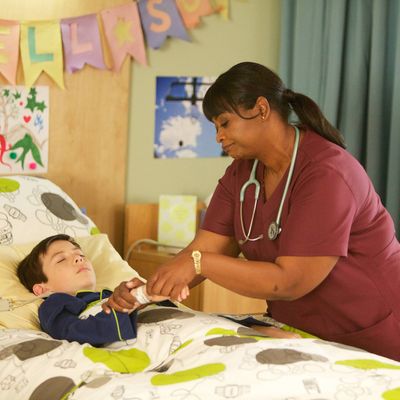
I don’t know that I want to watch a show about children dying of cancer. Probably not? But now that I’ve seen Red Band Society, I’m sure that I do not want to watch a show about children kinda having a blast while being treated for cancer. Isn’t it secretly fun to be a child living with a severe, life-threatening illness?! Apparently it is.
Fox’s newest teen drama is set in a fancy-schmancy L.A. hospital, where a group of seriously ill young people form a supportive clique. Jordi’s so cool, he convinced a doctor to amputate his leg without his parents or legal guardians being present, ever, at all! (“My mom died. My dad … it’s complicated.” Sure, okay, one amputation, coming up. Free surgery when you show up with gumption.) The cheerleader who’s so heartless? Well, yeah — she needs a heart transplant for real, she has a heart virus. Dash needs a lung transplant because he has cystic fibrosis, but he can still skateboard around just fine. The girl in the fashion hat is being treated for an eating disorder because there are no special facilities that focus on that. Leo might be bald from chemotherapy, but he’s got eyebrows for days, plus tons and tons of sage wisdom. We learn all this from our narrator, Charlie. “This is me, talking to you, from a coma. Deal with it!” he tells us. You know … I don’t think I’m going to.
Again, I’m not lobbying for a show about suffering, necessarily. But Red Band makes hospital stays seem like a spread in an Urban Outfitters catalogue. Come for the osteosarcoma, stay for the funky vintage vinyl and artfully draped twinkle lights. Party on the roof! Bring weed! Bring beer! Let’s have strenuous, daylong shenanigans outside the hospital because certainly none of us could be tired or at all unable to lead a totally normal life. “Your body isn’t you, your soul is you, and they can never cut into your soul,” Leo tells Jordi before his amputation surgery. Is that really true? Surely illness affects our “souls”; surviving something awful (even just the ordinary agonies of adolescences) makes us who we are. It doesn’t make us bad or crazy or worthy of pity or abuse, but it does alter us. Coming-of-age stories are about change because actually coming of age is about change.
Every review of Red Band Society is legally obligated to mention The Fault in Our Stars, a profoundly superior example of the sick-teen genre, even though beyond the “sometimes kids get sick” idea, the stories don’t have a tremendous amount in common. But it is true that sometimes kids get sick. Sometimes their families put a “send pizza” sign in their hospital windows for fun. And sometimes the pilots for teen dramas co-opt that exact move in a schmaltz tsunami sent to destroy us. I suppose there are contexts in which lifting a real-life gesture made by the real-life parents of a real-life child with real-life cancer would be okay, but this doesn’t seem like one of those instances.
I absolutely feel like a monster for disliking Red Band so much, given that it’s scientifically engineered to be inspirational and moving and heartfelt and all. But even Octavia Spencer (as a wise, I’ve-seen-everything nurse) can’t wrest this show from the clutches of the Mecha-Phoniness. Every exchange, every alleged feeling, every moment designed to be reproduced in GIF form on Tumblr — I didn’t buy any of it. Maybe as the show moves forward, it’ll dig in deeper and find a shred of authentic human experience inside, but the pilot has no credible emotions. Shows don’t need to be realistic to feel real: Glee, for example, in its glory days managed to be over-the-top and ridiculous and campy while still exploring and portraying authentic, true feelings. Red Band has built-in life-or-death stakes. Too bad everything feels too artificial to seem important.

